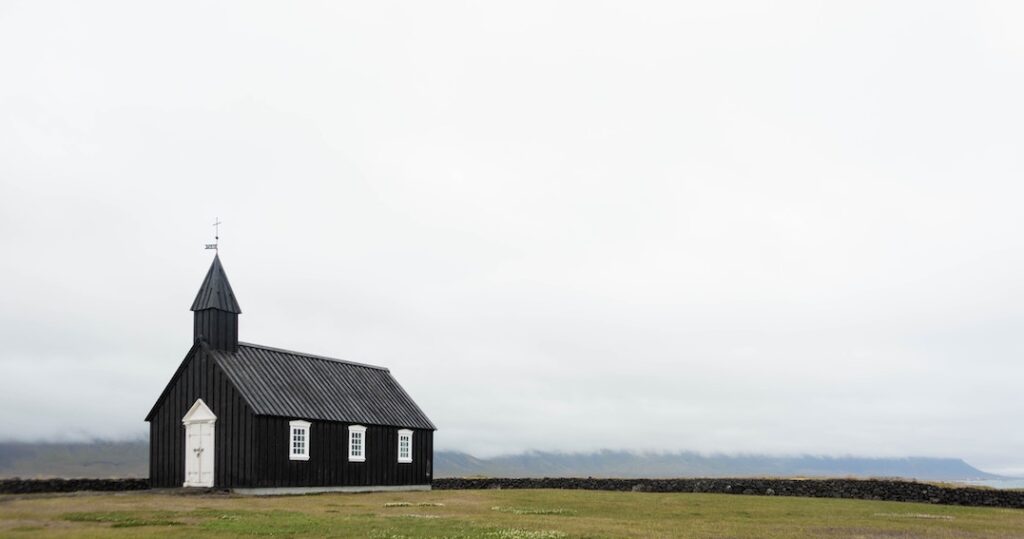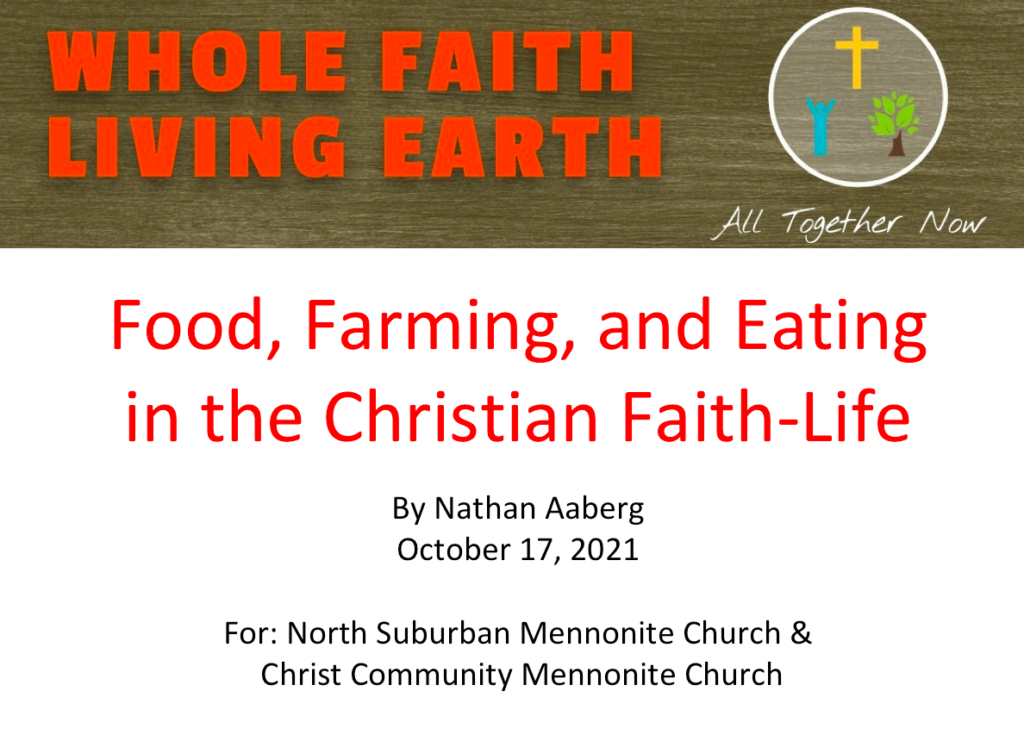I was driving home late last year on a familiar road when I saw a sign for a new church that I had not seen before.
There was no traditional church building in sight. But there was a barn with fresh red metal siding and a metal roof. That, I realized, was the church’s sanctuary. Intriguing.
Perhaps this was it. Perhaps the alternative approach to church architecture signalled an assembly of believers where Creation mattered, where people really believed God loves the whole world. Could this be a community of faith where Creation’s presence in the Bible was reflected in theology, culture, and way of living? Maybe this would be a place where I could belong.
After pulling away from church a number of years ago, I’ve longed for belonging around faith and Jesus. Seeing that new church in a non-traditional building brought that old familiar pang back to the surface of my heart.
When I got home, I promptly visited the church’s website. It was bright and well-designed. Its photos and text highlighted the church’s racial diversity. The faces, set against a background of wooden barn walls, were friendly, enthusiastic. Promising, I thought.
I found the “What We Believe” section of the website. Hope crashed into reality.
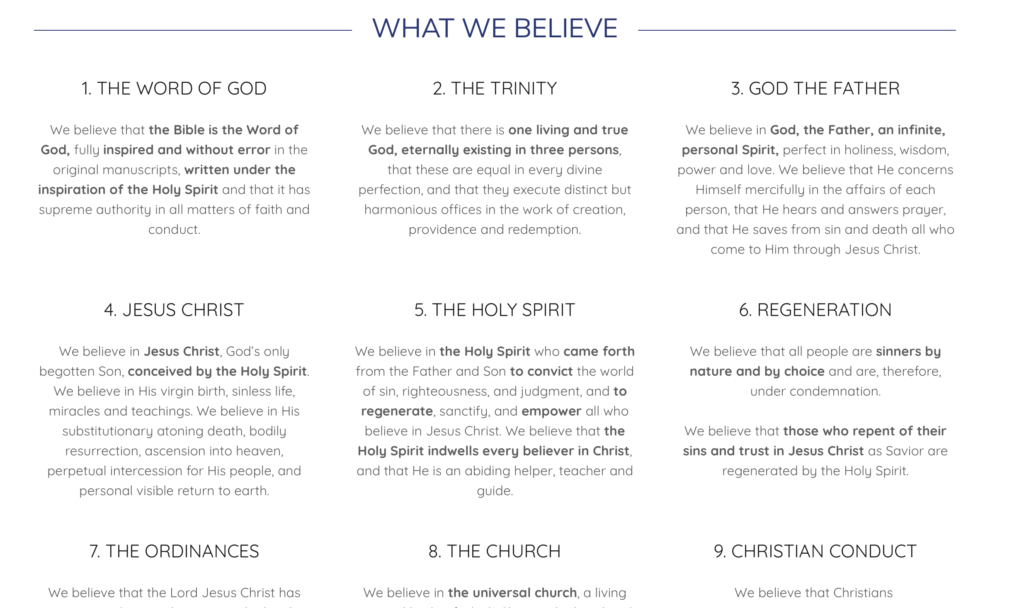
Not a word about Creation. Not a single word.
I have to admit this – in that moment, for a moment, I questioned myself.
Maybe I am wrong, I thought. Maybe there’s a good reason why so many churches don’t speak about Creation or care about it. And maybe staying away from church is a rebellion against God’s will. Doesn’t the New Testament speak clearly about the obligation and rewards of being with other followers of Jesus?
That old familiar pang pressed against my heart. Here I was again, feeling guilt for not going to church while longing for belonging in a faith community.
Am I Unforgiving?
Some new friends, who I met at a field walk last September at their farm, suggested a different way for me to consider my situation.
They are faithful believers who steward their land carefully and attend a church in Indiana. There they often find themselves alone in expressing a Creation care consciousness. They are not always understood.
During the field walk, we had bonded over our common convictions. I had shared my challenges in finding a church. They wrote this in a recent email:
For us, it’s forgiveness every single time we walk into our church. It can be a struggle for fellow Christians to understand our views, but we think it’s important to lend grace and forgiveness so we can continue to educate them on this matter. People are starting to listen, starting to realize the connection we have to all of His Creation. We pray that you can find forgiveness in your heart so you can go out to disciple this to His people.
These words brought me up short.
Was that the problem? Am I not being forgiving? Was that why I couldn’t fit in and make a home at a church?
Perhaps I needed to commit myself to forgiving fellow believers as they would need to forgive me for my own blind spots. If I repented of the judgments I was making, would I then be able to find a church where I could belong?
A Buck Outside the Window
More recently, I was having a conversation with a coworker at the nonprofit I work for in a room with a wide window. Out of the corner of my eye I saw movement in one of our organization’s farm fields roughly 80 yards away. I couldn’t help myself. In mid-conversation, I turned to look closer. Through a row of trees between us and the field, I saw a deer. It was a young buck. The head it held high had a small set of antlers.
Then it strode through the row of trees and onto the lawn south of our office. This was midday. It was now in full view and less than 30 yards away in the middle of a subdivision* in a Midwest town.
By now, I was no longer pretending to be engaged the conversation. We both watched as the buck strode across the lawn. Its eyes were watchful. Its posture powerful.
He passed out of sight. The lawn seemed a wilder place even with him gone. My mind and heart were still absorbing the experience even as my coworker renewed the conversation as if nothing unusual had happened and without a word about the buck.
Ears to Hear
Jesus sometimes used the phrase, “He who has ears to hear, let him hear.” (Matthew 13:9, Mark 4:9, Luke 8:8, etc.)
In recent weeks I’ve encountered stories and insights that convince me that…… well, let me share them first and then share my conclusion.
The first came from an article in Christianity Today about Bono’s newly published memoir. In it, Bono shares his recollection of a conversation he had with Franklin Graham, the son of Billy Graham. Billy Graham, one of the most famous Christian evangelists of recent history, had invited Bono to visit him. Franklin had picked him up at the airport. From the conversation that Bono recollects, it’s clear that Franklin was dubious about whether the rockstar Bono was an authentic Christian.
“You … you really love the Lord?” (Franklin)
“Yep.” (Bono)
“Okay, you do. Are you saved?”
“Yep, and saving.”
He doesn’t laugh. No laugh.
“Have you given your life? Do you know Jesus Christ as your personal Savior?”
“Oh, I know Jesus Christ, and I try not to use him just as my personal Savior. But, you know, yes.”
“Why aren’t your songs, um, Christian songs?”
“They are!”
“Oh, well, some of them are.”
“What do you mean?”
“Well, why don’t they … Why don’t we know they’re Christian songs?”
I said, “They’re all coming from a place, Franklin. Look around you. Look at the creation, look at the trees, look at the sky, look at these kinds of verdant hills. They don’t have a sign up that says, ‘Praise the Lord’ or ‘I belong to Jesus.’ They just give glory to Jesus.”
Killer Whale Theology
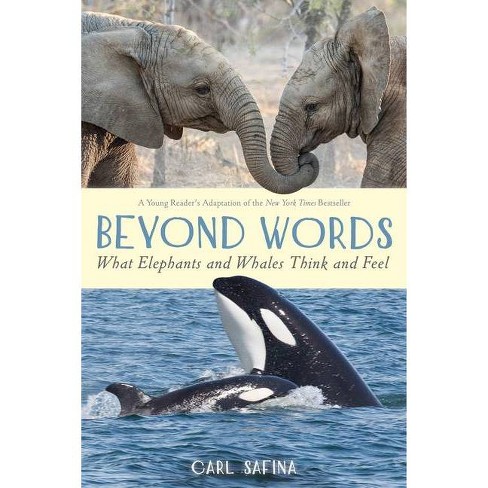
In Beyond Words: What Animals Think and Feel, ocean advocate Carl Safina opens the reader’s mind and heart to the complex world of killer whales.
Three things astonished me. The first is the very creatures themselves. There is, for example, not just one generic kind of killer whale. There are actually estimated to be eight types of killer whales. Some eat only fish, primarily salmon. Others prefer mammals. One type, much smaller than the type that eats seals off of ice flows, hunts penguins. Yet another type hunts sharks. Regardless of type, these are highly social animals with matriarchal leadership. Oddly, pods of the same type of killer whales will not socialize with other pods of the same type. They have their own cultures. Yet, killer whales in the wild have never been seen being aggressive to each other.
Their vocal communication capacity is amazing.
“Killer whales in a group can be spread out over 150 square miles – and all be in vocal contact,” write Safina.
Having huge nerve cells for hearing and generating sounds from skulls that are sophisticated technologies, killer whales (like other dolphin species and whales) inhabit a world we can only dream of. They live, in fact, by sound.
The second remarkable thing is how little humans have known about killer whales for most of human history. It was only in 1960, just over 60 years ago, that a researcher discovered that dolphins relied on sound for so much and that eyesight was a secondary source of information. And it’s been even more recently that people have differentiated the different types of killer whales and discovered that each killer whale has its own individual personality and remarkable social intelligence.
And the third most remarkable thing?
After detailing how powerfully effective killer whales can be as hunters, with some even hunting down 30,000-pound sperm whales, Safina writes this:
“Even stranger, then, that killer whales have overturned no kayak, emptied no rowboat, and slurped no human. It is perhaps the greatest behavioral mystery on our mysterious planet.”
Seeing Blue
In Joni B. Cole’s excellent and warmly witty book on writing – Good Naked – she has a chapter entitled “Seeing Blue.” In it she argues why each writer’s writing matters and is worth pouring energy into, even when it seems to have no immediate reward.
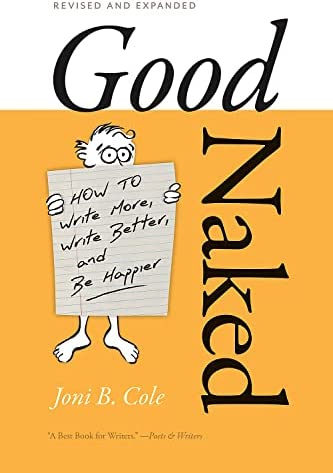
Here’s a paragraph in that chapter. It follows her statement that the Egyptians were likely the first civilization to create a word for the color blue and that research indicates few people until modern times really noticed it as a color (don’t worry – you’ll see the point in just a bit):
The claim that a culture with no word for a color it cannot see is supported by a contemporary study with the Himba tribe in Namibia, whose language has several words for nuanced shades of green, but nothing to describe blue. When shown a screen with eleven green squares and one distinctly blue square, the Namibians could not pick out the blue one. Yet, among the green squares that appear identical to a Westerner’s eyes, they could immediately identify the different shade. The ability to see or not see a shade speaks to its important to a culture. Now just imagine if every culture had the ability to see every kind of color!
Her point – every writer has the potential to help readers see something they could not see before.
What I also see in her words is this – our culture can blind us to truth that is right in front of us.
A Misfit Who Can’t Unsee Blue
The blue so many churches and so many church cultures cannot see is the life, beauty, mystery, and vulnerability of God’s Creation all around us. The blue that Franklin Graham and many other Christians cannot see is that Creation matters deeply to God and that care of Creation is part of the very core of what we were created for.
I can’t unsee that blue.
Nor can I force Christians who are happy with their churches to see that blue if they don’t want to see it. Nor do I believe that many churches, who are struggling with declines in attendance, will be open to changing their culture and theology around Creation.
So what is worse? Going to church and not belonging because I see a color in the Bible and Creation others won’t see? Or not going to church and missing the fellowship and singing of songs with other believers? Of longing for belonging to a group of people committed to God and Jesus in a whole way?
Right now, despite those old familiar pangs that emerge from hidden places in my heart when I see a church, I’ve come to accept that I am what Jon Terry called me in our conversation earlier this year.
A misfit.
That’s who I am.
Or, if one puts a more positive spin on it, you could label me an “edge walker,” a term Valerie Loorz calls herself in Church of the Wild.
Is there any reason to think such a path could be faithful to God?
When Jesus responded to the Pharisees who complained that he was healing people on the Sabbath (Luke 14:5), he asked them if they would not act on the Sabbath, despite the prohibition on work, if they heard a child or an ox stuck in a well.
When you imagine the scenario that Jesus presented to the Pharisees, you cannot help but hear the cries. Whether a child or ox fell in a well, there would have been heart-rending sounds – the pleading screams of the child, the plaintive bellows of the ox.
My ears can’t unhear the cries of Creation today. Nor can I unhear the lamentations of people whose lives are or will be in misery because of what is being done to Creation.
Pretending I couldn’t hear those cries or shutting my ears to those cries would be, in my mind, a betrayal of God.
I see the blue.
I hear, and I listen.
And what I hear (and oh how I wish I could hear the sounds of killer whale clans as they race through the ocean) resonates with the thread of Creation’s worth through the whole Bible.
So I need to act as best I can.
I pray that people out there who are like me will find each other and act out of the convictions we have from our faith.
Perhaps we will together form new wineskins?
And perhaps many years from now there will be people who drink the vintage of the wine from those wineskins and smile and nod and make more of their own and please God in the process.
*To be fair, the subdivision is not just any subdivision. It is the Prairie Crossing conservation community, where a significant amount of habitat has been set aside and managed for natural habitat. This makes the buck’s appearance just slightly less surprising. But still a remarkable moment in the middle of an afternoon.

